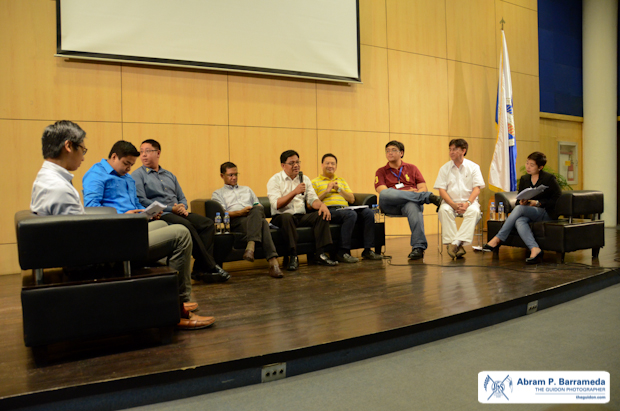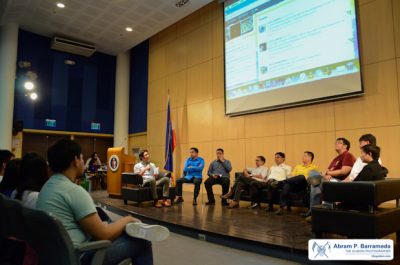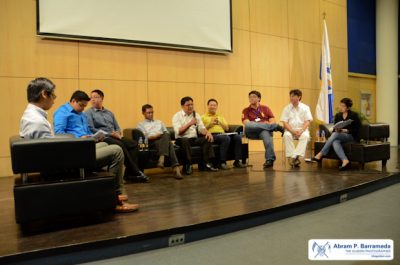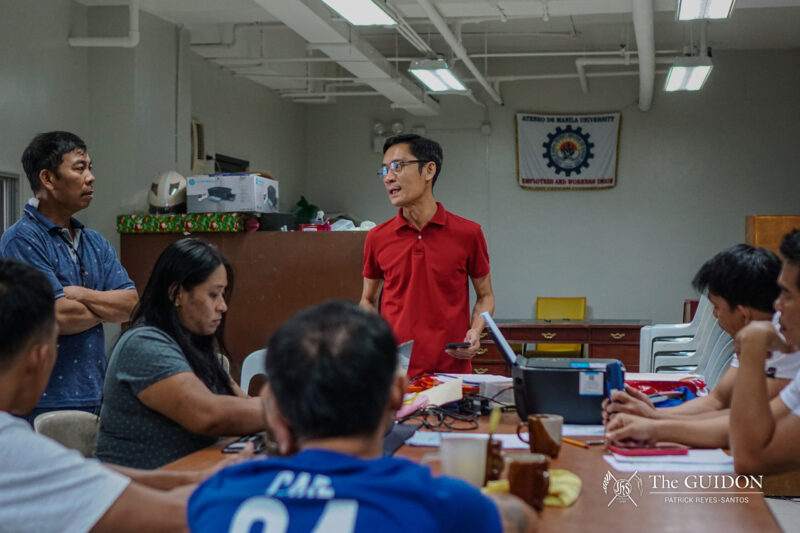“NARARAMDAMAN BA? Does Juan and Juana feel the improvements that the President tells us?”
According to Political Science Department Assistant Professor Anne Candelaria, PhD, these are the questions that must always be asked after every State of the Nation Address (SONA).
Candelaria was the forum coordinator of The Ateneo Assembly’s post-SONA forum held last August 5 at the Ricardo and Dr. Rosita Leong Hall auditorium.
The forum, entitled “Face the Nation,” was held to assess the real situation of the country, given what President Benigno Aquino III said during his fourth and longest SONA last July 22.
The panelists of the event were the following: National Youth Commission (NYC) Commissioner Earl Saavedra, Caucus of Development NGO Networks Program Specialist Jet Pacapac, Bayan Muna representative Teddy Casiño, Ang Kapatiran representative Rizalito David, Kabataan Party-List representative Atty. Teddy Ridon, Anakpawis Party-List representative Rafael Mariano and Sanggunian President Dan Remo.
Among the topics of Aquino’ SONA were the following: The expansion of the Pantawid Pamilyang Pilipino Program, the inclusion of families with 18-year-old children into the conditional cash transfer program, improvements in the Department of Education and expanded PhilHealth coverage.
Though the speech ran for an hour and 44 minutes, Aquino failed to mention the Asean Economic Community (AEC), the K to 12 program, the Reproductive Health (RH) Law, the Political Dynasty Act and the Freedom of Information (FOI) bill, among others.
These were some of the issues Ateneans hoped Aquino would address, according to a survey conducted by The Ateneo Assembly.
Face the Nation
As a national situationer, Face the Nation evaluated segments of Aquino’s SONA with the question “Did he really deliver?”
Panelists discussed issues regarding education, health, economy, national security and governance in the country.
With regard to education, NYC Commissioner Saavedra said that “reforms are very essential.” According to him, one of the education reforms to be made by the government is making tuition fees more reasonable.
“Tuition fees are not the only things students worry about. They also have to worry about food, books and other things,” he said.
Meanwhile, Sanggunian President Remo expressed his disappointment over the exclusion of student rights and welfare in Aquino’s priority agenda.
“It’s not just about whether you can go to school or you can eat. The quality of your education, your formation is missing,” he said in Filipino.
Remo added, “Schools are becoming profit-minded now. It’s becoming a business. And what happens here is that students lose the sense of empowerment… Education is not just [about] teaching [and] giving you the knowledge, but also empowering you as a citizen.”
Meanwhile, Bayan Muna representative Casiño talked about the discrepancy between the number of enrolled PhilHealth members and the number of members who actually avail of PhilHealth’s benefits.
Aquino said that PhilHealth coverage has expanded from 62 percent in 2010 to 81 percent in 2013.
“Up to now, we still don’t know how they (Aquino administration) got that 81 percent,” Casiño said.
According to him, 81 percent is not the percentage of active PhilHealth memberships; rather, it is only the “database of names listed under their coverage.”
Casiño added that his work with public hospitals led him to discover that only around 30 percent of patients have PhilHealth coverage.
During the forum, Ang Kapatiran representative David commented on Aquino’s SONA in general.
According to him, the “theme” of this year’s SONA was, “If you don’t have anything to say, lengthen it so that it will seem as if you’re saying something.”
“The State of the Nation Address is more than just a rendering of a report of facts and figures of what the administration did for a particular period,” David added.
Political Science Department lecturer Hansely Juliano shared the same sentiment in a separate interview with The GUIDON last August 6.
According to him, Aquino’s SONA was filled with figures “interpreted very creatively in order to make the case that government is achieving something, even if the plain reality is that the roots of such problems have not been addressed.”
Left unsaid
Juliano further mentioned several issues Aquino failed to discuss during his SONA.
“It is quite remarkable how President Aquino’s administration has managed to cram, in many instances, ‘good news’ and testaments of a satisfied national constituency that stumps its critics—despite glaring indications of the fact that there are still so many issues and socio-political tensions that it has not addressed,” Juliano said.
He added that although several of Aquino’s allies in Congress strongly push for charter change, Aquino has made no mention of it in his SONA.
Juliano also noted that the FOI bill, said to be “the cornerstone of [Aquino’s] transparent governance,” received no attention in this year’s SONA.
Meanwhile, Development Studies Program Director Leland Dela Cruz, PhD, in a separate interview with The GUIDON last August 5, suggested that, aside from the AEC and the FOI bill, the Aquino administration should put more attention on the agricultural sector.
Dela Cruz also brought up the issue of job creation, which was not discussed thoroughly in the SONA.
“Job creation is a long-term problem. It cannot be addressed by short-term policies. For me, job creation is a structural problem and given the limits of our structure, this is the best that we can do,” he said.
Setting things in motion
Although Aquino failed to mention several key issues, Dela Cruz said that he found this SONA better than Aquino’s previous ones.
“For me, the first half of the speech was really [about] how the development strategy of the government tries to be more inclusive… Tries to, in a sense, democratize the benefits of economic growth,” he said.
“The second half was to give the political stimulus needed to set some things in motion,” Dela Cruz added.
Similarly, University President Jose Ramon Villarin, SJ said he still feels “good that things are moving” with regard to the reforms being made by the Aquino administration.
“I think he (Aquino) has adjusted now well into the job, [and] things are moving. I don’t think he needed to trumpet all the things that are happening, but I’m happy,” Villarin said.
However, he added that Aquino’s SONA aired the difficulties experienced by the government.
“You could see the impatience there with [the Bureau of] Customs and other agencies. He (Aquino) singled out [the Technical Education and Skills Development Authority],” Villarin said.
“He was mentioning all these names, but in the end, you can see what’s the drive. The drive is to get things going,” he added.
Dela Cruz also said that while the Aquino administration seems to be moving in the right direction, “[Aquino’s reforms] could have been done much faster.”
He expressed the worry of several government workers regarding how the current changes and reforms will be sustained after the Aquino administration has ended.
The next step
In the last leg of the forum, the panelists discussed their thoughts on good governance.
Pacapac called on those present at the forum to consider working for the government, even for non-government organizations.
Saavedra echoed this, adding that in order for there to be good governance, there needs to be an empowerment of the youth sector, a movement towards participatory government and partnerships between the government and its citizens.
Casiño added Filipinos should take part in initiating change.
“Until there is no change, these presidential pronouncements will be meaningless. In light of these, let’s take a stand. Let’s not be whiners,” he said.
“Bayan muna bago ang sarili.”
With reports from Joline S. Acampado









